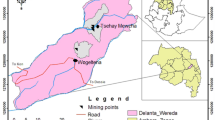Abstract
Mining-induced displacement and resettlement is an important development issue because it significantly influences the livelihoods and sustainability of mining communities. This study seeks to assess the effects of mining-induced displacement and resettlement on the livelihoods of households in selected mining communities in Ghana. The mixed-method approach was used to conduct this study, permitting the collection of both quantitative and qualitative data. The quantitative data were collected through the interview of 195 household heads, while the qualitative data involved the interview of six representatives of relevant institutions. The results of the study showed that mining-induced displacement has both positive and negative effects on indigenous mining communities. In terms of the positive effects, there was an improvement in access to social infrastructure such as health, education, and potable water in the study communities. The results of the study also showed that there is an increase in the disposable income of the respondents, and this can be attributed to the increase in service-related activities. In terms of the negative effects of mining-induced displacement and resettlement, there was loss of social and human capital, alterations in economic activities, lower satisfaction with life (SWL), and loss of natural capital in the indigenous communities. The lack of awareness of the regulations that guide resettlement and displacement among indigenous mining communities has adversely affected their ability to effectively participate in the resettlement process. There is therefore the need to educate mining communities on the regulations that guide the resettlement process. Additionally, mining companies should conduct impact assessments in the resettled communities to assess the effects of the resettlement process on the indigenous communities.




Source: Field survey, October 2021

Source: Field survey, October 2021

Source: Field survey, October 2021

Source: Field survey, October 2021

Source Field survey, October 2021
Similar content being viewed by others
References
Aboagye S (2014) Mining and resettlement of communities in ghana: exposing the harm caused by forced displacement and relocation. Toronto MiningWatch, Canada
ActionAid (2008) Precious metals: the impact of anglo platinum on poor communities in Limpopo, South Africa
Afriyie K, Ganle JK, Adomako JAA (2016) The good in evil: a discourse analysis of the galamsey industry in Ghana. Oxf Dev Stud 44(4):493–508
Agbley GK (2019) Land grabbing and the gendered livelihood experience of smallholder farmers in Northern Ghana: through a human development and capability lens. Ghana J Dev Stud 16(1):155–180
Aubynn EA (2003) The community perception on mining; experience from western Ghana. Master ‘s Thesis. Department of Atmospheric Science; University of Alberta Canada, Department of General and African Studies.
Baddianaah I, Baatuuwie BN & Adongo R (2022) The outbreak of artisanal and small-small gold mining (galamsey) operations in Ghana: institutions, politics, winners, and losers. J Degrad Min Lands Manag 9(3):3487–3498
Cernea MM (1997) The risks and reconstruction model for resettling displaced populations. World Dev 25(1):1569–1587
Creswell JW, Fetters MD, Ivankova NV (2004) Designing a mixed methods survey in primary care. Ann Fam Med 2(1):63–72
Dilman DA (2007) Mail and internet surveys: the tailored design methods: update with new internet, visual and mixed-mode guide. Wiley, Hoboken, New Jersey
Downing TE (2002) Avoiding new poverty: mining-induced displacement and resettlement, IIED, and WBCSD. Research Paper No, London, p 58
Ghana Investment Promotion Centre (2020) Mining and mineral processing sector. Accra
Ghana Statistical Service (2010) Population & housing census, Ghana Statistical Service, Accra
Kemp D, Owen JR, Collins N (2017) Global perspectives on the state of resettlement practice in mining. Impact Assess Proj Apprais 35(1):22–33
Kidido JK, Ayitey JZ, Kuusaana ED, Gavu EK (2015) Who is the rightful recipient of mining compensation for land use deprivation in Ghana? Resour Policy 43:19–27
Lujala P (2020) Ghana’s mining communities are still not getting their just dues [online]. Available from: https://theconversation.com/ghanas-mining-communities-are-still-not-getting-their-just-dues-128638. Accessed 23 Feb 2023
Mandishekwa R, Mutenheri E (2020) Mining-induced displacement and resettlement: an analytical review. Ghana J Dev Stud 17(1):114–140
Owen J, Kemp D (2014) Free prior and informed consent, social complexity and the mining industry: establishing a knowledge base. Resour Policy 41:91–100
Ozawa S, Pongpirul K (2014) Research in health systems. Health Policy Plan 29:323–327
Peprah P, Abalo EM, Amoako J, Nyonyo J, Duah WA, Adomako I (2017) “The reality from the myth”: the poor as main agents of forest degradation: lessons from Ashanti region. Ghana Environ Soc Econ Stud 5(3):1–11
Sasu DD (2023) Quarterly contribution of the mining industry to GDP in Ghana 2019–2021 [online]
Terminski B (2012) Mining-induced displacement and resettlement: social problem and human rights issue. Genf, 2012; URN: http://nbn-resolving.de/urn:nbn:de:0168-ssoar-327774
Twerefoo, O.P., (2021) Mining-induced displacement and resettlement policies and local people’s livelihoods in Ghana. Dev Pract 31(6)
Twum SE et al (2016) Stakeholders participation and sustainability of corporate social responsibility programmes in Ghana: a study of anglogold Ashanti mine in Obuasi. Environ Nat Resour Res 6(1):1–8
Author information
Authors and Affiliations
Contributions
Mr. Rich Ofori and Dr. Stephen Appiah Takyi collected data and wrote the main manuscript text. Dr. Owusu Amponsah and Mr. Desmond Gagakuma helped in the the review of the manuscript.
Corresponding author
Ethics declarations
Conflicts of interest
There is no conflict of interest. The research team funded this research.
Ethical approval
This article does not contain any studies with human participants performed by any authors.
Informed consent
Informed consent was obtained from all individual participants included in the study
Additional information
Publisher's Note
Springer Nature remains neutral with regard to jurisdictional claims in published maps and institutional affiliations.
Rights and permissions
Springer Nature or its licensor (e.g. a society or other partner) holds exclusive rights to this article under a publishing agreement with the author(s) or other rightsholder(s); author self-archiving of the accepted manuscript version of this article is solely governed by the terms of such publishing agreement and applicable law.
About this article
Cite this article
Ofori, R., Takyi, S.A., Amponsah, O. et al. Mining-induced displacement and resettlement in Ghana: an assessment of the prospects and challenges in selected mining communities. Soc. Netw. Anal. Min. 13, 61 (2023). https://doi.org/10.1007/s13278-023-01075-y
Received:
Revised:
Accepted:
Published:
DOI: https://doi.org/10.1007/s13278-023-01075-y




